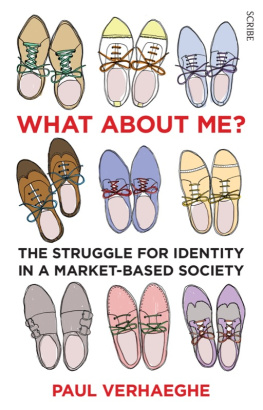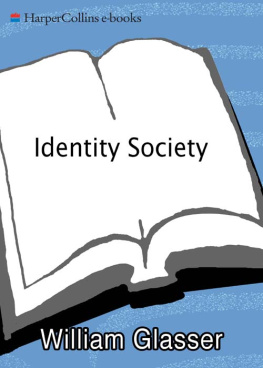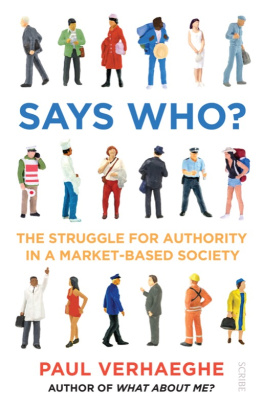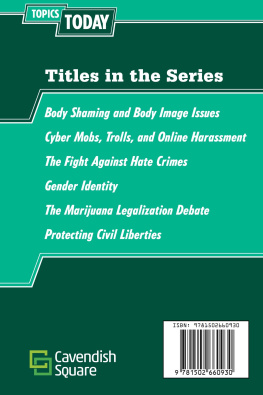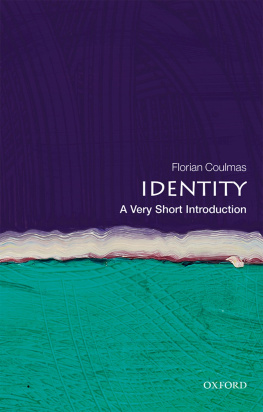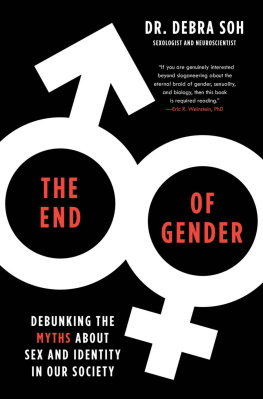
Scribe Publications
WHAT ABOUT ME?
Paul Verhaeghe is professor of psychoanalysis at the University of Ghent in Belgium, and is also in private practice. He is the author of Love in a Time of Loneliness and Does the Woman Exist?
Scribe Publications Pty Ltd
1820 Edward St, Brunswick, Victoria 3056, Australia
50A Kingsway Place, Sans Walk, London, EC1R 0LU, United Kingdom
First published as Identiteit by De Bezige Bij, Netherlands, 2012
Published by Scribe 2014
Text copyright Paul Verhaeghe 2012
English translation Jane Hedley-Prle 2014
All rights reserved. Without limiting the rights under copyright reserved above, no part of this publication may be reproduced, stored in or introduced into a retrieval system, or transmitted, in any form or by any means (electronic, mechanical, photocopying, recording or otherwise) without the prior written permission of the publishers of this book.
The moral right of the author has been asserted.
National Library of Australia
Cataloguing-in-Publication data
Verhaeghe, Paul, author.
What about Me?: the struggle for identity in a market-based society / Paul Verhaeghe; Jane Hedley-Prle (translator).
9781922072948 (e-book)
1. Identity (Psychology). 2. Social change. 3. Individual differencesSocial aspects. 4. SuccessPsychological aspects. 5. Failure (Psychology).
Other Authors/Contributors: Hedley-Prle, Jane, translator.
155.22
scribepublications.com.au
scribepublications.co.uk
Contents
1.
2.
3.
4.
5.
6.
7.
8.
INTRODUCTION
A middle-aged man is being lashed to a wooden pallet with duct tape by four other men. One of his attackers draws two zeros on his forehead with a marker pen, another presses his genitals against the mans face, the third sits on him with bare buttocks, and the fourth takes pictures. The group are clearly enjoying themselves. Everything is captured on film, and the victim is even given a copy of the clip to watch at home.
The scene of the action was an ordinary little factory in a small Belgian town. The man with the camera was a union representative. Quite a few people joined in; nobody tried to intervene. It later turned out that the bullying had been going on for years. In the days after the images were broadcast on television news, victims of similar incidents came forward with their stories. The first reported incident had happened in Wallonia, the French-speaking region of Belgium. But a week later it was the turn of Belgiums Dutch-speaking community to be shocked when a case of bullying was reported in Flanders. A crane driver working for a steel concern had suffered regular humiliation at the hands of his foreman and the boss of his shift. They pulled his trousers down, scrawled obscenities on his buttocks, and tied him to a jeep and drove him around. Afterwards they posted the clips on YouTube. In the month that followed, bullying remained a hot media item. Various sources revealed surprisingly high figures: 1015 per cent of employees in Beligium are bullied. This calls for an explanation, and apparently there are plenty of them.
The first comes from the reactionaries. They claim that bullying is caused by the loss of social norms and values. In fact, thats their explanation for just about any social problem from the aggression faced by public-transport workers and the increase in child abuse, to thieving asylum-seekers and the harassment of teachers. Things were better in the old days.
A second group looks to the sphere of mental health for a cause. Violent offenders are disturbed individuals. A mother who abuses her baby is mentally ill, surely? Its a reassuring thought. Experts testifying in criminal cases speak of antisocial personality disorder (a recognised mental-health condition), and point to early signs of it in children, in the form of oppositional defiant disorder. There has been a sharp increase in both diagnoses in recent decades, and this is less reassuring.
A third explanation takes the medical reasoning a step further: its a question of human nature, the hidden animal in all of us. The killers in Nazi concentration camps were just ordinary people, and psychological experiments show that almost anyone becomes a sadist under certain conditions. Homo homini lupus est man is a wolf to his fellow man.
Oddly enough, another explanation directly contradicts this view: people are essentially good, and its postmodern society that makes us bad. Take away all those violent computer games, and aggression will decrease sharply.
Evil let us not shrink from using this word certainly isnt alien to us. Hannah Arendt made this painfully clear in her report of the trial of Adolf Eichmann, in which she spoke of the banality of evil. The notion of human depravity ties in with Christian teachings about original sin, while a more modern version invokes our selfish genes.
Both the view that we are inherently good and the view that we are inherently bad create the impression that there is an unchanging human nature waiting to manifest itself. Thats strange, given the quest for identity that is so ubiquitous in the Western world the quest for true norms and values. Apparently we no longer know who we are, and that is why we keep running to all kinds of experts, from psychologists to brain specialists and other soothsayers, to discover our true selves.
This book stems from a different idea. There is no inherent identity: who someone is, whether good or bad, depends largely on their environment. If many people have nowadays lost their bearings, this says something about our environment. Apparently it has changed drastically, and therefore so have we . We dont feel happy about the situation that much is increasingly clear.
Why should a psychoanalyst write about these issues? What About Me? is rooted in my clinical practice. Like many of my colleagues, Im convinced that the problems for which people are seeking help these days are not just increasing, but also that their nature has changed.
In an earlier book, I wrote about the end of psycho-therapy, investigating the link between mental disorders and social change. I have since become convinced that the impact of these changes is much more far-reaching than previously thought. The neo-liberal organisation of our society is determining how we relate to our bodies, our partners, our colleagues, and our children in short, to our identities. And you cant get much more disordered than that. I take my lead here from Sigmund Freud in his Civilisation and its Discontents . And, just like Freud, I will not shrink from adopting clear ethical stances.
ONE
IDENTITY
In recent years, the discussion about identity has flared up nearly everywhere in Europe. The then princess Mxima, the wife of the Dutch crown prince, got into hot water when she made the claim, in 2007, that there was no such thing as a Dutch identity. The True Finns are the third-largest party in the Finnish parliament. Belgium is being torn apart by Flemish nationalism, and elsewhere in Europe nationalist political groups are gaining ground. There is a straightforward explanation: confrontation with different identities, in the form of immigrants and asylum-seekers, and thus confrontation with different norms and values, creates uncertainty. Identity is not the abstract quality we vaguely assume it to be: we determine our identity by placing it alongside and, increasingly, contrasting it with other possible identities.
Whereas identity used to be informed by predominantly local stereotypes (as in, Belgians versus the Dutch, or the English versus the Scots), current stereotypes have become globalised and socioeconomic: its now the indigenous population versus ethnic minorities, our Judaeo-Christian culture versus backward Islam, or the hard-working middle classes versus scroungers.
Next page
